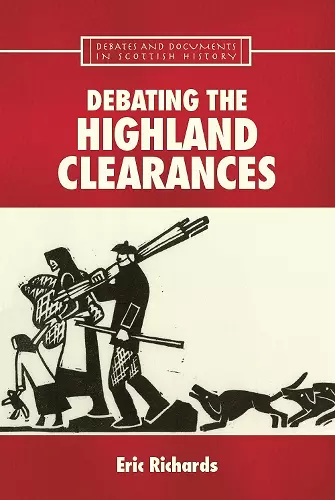Debating the Highland Clearances
Format:Paperback
Publisher:Edinburgh University Press
Published:13th Jul '07
Currently unavailable, and unfortunately no date known when it will be back

Storm clouds always gather over the story of the Highland Clearances. The eviction of the Highlanders from the glens and straths of the Highlands and Islands of the north of Scotland still causes great historical dispute more than a century after the events. The Highland Clearances also generated a great deal of contemporary controversy and documentation. The record comes in diverse forms and with radically different provenances, offering excellent material for exercises in historical analysis and selection. Debating the Highland Clearances introduces the Highland Clearances as a classic historical problem. Eric Richards reviews the historical debate and examines the methods and sources employed by the combatants past and present. The debates among historians, novelists, politicians and economists are no less passionate today and raise major questions about interpretation and the appropriate frame of reference for the noisy and continuing public debate about the Highland Clearances. This book presents a representative anthology of documents illustrating the historical foundations on which the debate is built. The debate is set in context and the author explains why it is not only important for Scottish patriots but for history in general. Key Features: * Organised into two parts; the first considers debates surrounding the Clearances, the second examines a selection of the sources which inform these debates * Presents and analyses an anthology of source material compiled to introduce the debates surrounding the Highland Clearances to audiences learning about historical analysis * Asks why passionate debate about the Clearances has been sustained and provides a modern introduction to its main issues
Richards challenges his readers to understand a historical phenomenon and wrestle with analysis of primary and secondary sources through two complementary sections! fills the gap where an analytical overview has been sorely needed. He offers no easy resolutions but encourages readers to wrestle with the very mixed motives, events and outcomes termed 'Highland Clearances' as well as with the dichotomised rhetoric which has characterised debate. -- Elizabeth Ritchie, University of Guelph Scottish Historical Review Graham examines the tensions and uncertainties of 1690s Scotland, and Edinburgh in particular, and how they led up to what for him amounts to a ritual sacrifice. In doing so, he sets himself the task of reconstructing the mindset of a community-no easy goal, but one which he accomplishes in availing himself of spiritual diaries, private correspondence, newspapers, parliamentary and church records, and pamphlets, among other valuable primary sources! This timely volume does not shy away from modern implications of the Aikenhead case. Graham has offered us not only a fine addition to the literature on seventeenth-century Scotland, but a portrait of contemporary life all the more vivid due to its relevance to debates we face over three centuries later. -- Nathan P. Gray, University of Glasgow Kelvingrove Review Although this book is of course focused on the clearances, it could make essential reading for any student or practitioner of history in how to write on a controversial topic. -- Annie Tindley History Scotland It is in this sense above all that the Highland Clearances are, as Eric Richards comments in his new book, 'a classic historical problem'. Because the issues at stake in the clearances were so basic to the formation of modern society, and because the economic and other forces then in conflict remain in conflict today in some of our planet's most crisis-ridden localities, there is not, and cannot be, anything approximating to a definitive verdict on the clearances. Debate, in other words, will continue. But if such debate is to yield more than endless contention, it needs to be well informed. Hence this book's value. -- James Hunter, UHI Centre for History Scottish Historical Review Richards challenges his readers to understand a historical phenomenon and wrestle with analysis of primary and secondary sources through two complementary sections! fills the gap where an analytical overview has been sorely needed. He offers no easy resolutions but encourages readers to wrestle with the very mixed motives, events and outcomes termed 'Highland Clearances' as well as with the dichotomised rhetoric which has characterised debate. Graham examines the tensions and uncertainties of 1690s Scotland, and Edinburgh in particular, and how they led up to what for him amounts to a ritual sacrifice. In doing so, he sets himself the task of reconstructing the mindset of a community-no easy goal, but one which he accomplishes in availing himself of spiritual diaries, private correspondence, newspapers, parliamentary and church records, and pamphlets, among other valuable primary sources! This timely volume does not shy away from modern implications of the Aikenhead case. Graham has offered us not only a fine addition to the literature on seventeenth-century Scotland, but a portrait of contemporary life all the more vivid due to its relevance to debates we face over three centuries later. Although this book is of course focused on the clearances, it could make essential reading for any student or practitioner of history in how to write on a controversial topic. It is in this sense above all that the Highland Clearances are, as Eric Richards comments in his new book, 'a classic historical problem'. Because the issues at stake in the clearances were so basic to the formation of modern society, and because the economic and other forces then in conflict remain in conflict today in some of our planet's most crisis-ridden localities, there is not, and cannot be, anything approximating to a definitive verdict on the clearances. Debate, in other words, will continue. But if such debate is to yield more than endless contention, it needs to be well informed. Hence this book's value.
ISBN: 9780748621835
Dimensions: unknown
Weight: 462g
256 pages